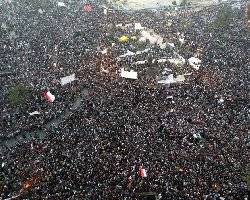The streets of Egypt are teeming with the telltale signs of an upcoming election.
Campaign posters fill the once-barren spaces on the sides of buildings, and billboards featuring the faces of candidates vying for a role in the new Egypt loom over the crowded streets of Cairo.
However, what many residents of the capital say is missing is a clear understanding of what will happen come November 28 - the day voting begins in the country’s first post-revolutionary parliamentary polls.
It is nine days before tens of millions of Egyptians are expected to vote in a three-part process to pick candidates for the lower house of parliament, followed by another three-round process to select members of the upper house, or Shura Council.
Yet the sentiment that seems to permeate conversations is one of confusion - over how the voting process works, what the candidates stand for and, most of all, what Egyptians stand to gain or lose from the historic vote.
"There are so many candidates running this year. Half of them, I’ve never even heard of, and they probably are all running for their own self-interest," says Mohammad Ibrahim, a 29-year-old taxi driver from the city of Helwan.
What is more, he says, is that most Egyptians have no time to decipher the complicated electoral process ahead of voting.
"Between long working hours, my family and other responsibilities, I don’t even have time to watch TV for five minutes.
"And just look at the previous elections. June 2005 went well, but every other election has been rigged. So what incentive do I have to be interested this time around? There is none."
Amid the skepticism, however, Ibrahim says he sees some chance for hope and intends to vote for Mustafa Bakry, a former MP running as an independent in the Maadi suburb of Cairo - a candidate whom he says "speaks the truth".
Other Egyptians say that they are still unsure of which candidate’s name to choose when they head to the voting booth.
"I don’t know who I’m going to vote for," says 32-year-old Mohamed Abu Zaid, the manager of a popular coffee shop in Maadi and a resident of Giza.
"That’s not saying I haven’t voted before, but when I did, the person I voted for didn’t fulfill any of his promises. And the elections have always been rigged. So I don’t see anyone who can represent me."
History of fraud
In a country with a history of elections marred by allegations of fraud, Abu Zaid is not alone when he says many Egyptians had no need to understand the election process in the past.
Nine months after the fall of former-president Hosni Mubarak in an 18-day popular uprising, Abu Zaid says these elections could have marked the start of something new.
"The revolution was teeming with possibilities - anything could have happened to change the old system," he says.
"But we didn’t take advantage of the opportunity. Why? I don’t want to say this is the Egyptian way but you can't just give democracy to them in a full package. You can't have a country that has been oppressed for 50-60 years - they didn't have an opinion, their voices didn't matter and you give them that kind of platform now - all their views will be misguided."
In a bid to discourage that kind of sentiment, some political activists have taken it upon themselves to educate constituents on how the voting will work and why they should head to the polls.
In the midst of a mass protest rally demanding an end to military rule in Cairo’s Tahrir Square on Friday, activists set up a lone election booth designed to inform passersby on how the process works.
Still, some Egyptians complain of the lack of a mass public awareness campaign - one that they say should be run by the government to ensure every voter knows how to participate.
"I don’t really know the electoral process," says Mohamed Awad, a 26-year-old waiter.
"We know there are certain people running but until now I don't know what their agenda is and what they want to achieve or who they are."
While Awad may not know the names of candidates he'll choose in the election, he does know which party he will vote for.
"There are a few days left until elections and what's most clear is that the Muslim Brotherhood is the most organized, so I should vote for them."
PHOTO CAPTION
Thousands of Egyptian protesters gather in Cairo's landmark Tahrir Square.
Source: Aljazeera.net


 Home
Home Discover Islam
Discover Islam Quran Recitations
Quran Recitations Lectures
Lectures
 Fatwa
Fatwa Articles
Articles Fiqh
Fiqh E-Books
E-Books Boys & Girls
Boys & Girls  Articles
Articles










